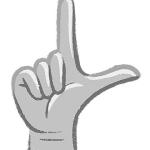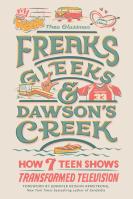Glee and Happy Endings
An Excerpt from Freaks, Gleeks, and Dawson’s Creek by Thea Glassman
Often, [creator Ryan] Murphy would come into the writers’ room and have an episode idea in mind. Usually it would be a theme, like love or tolerance, that could be neatly written by Mr. Schue on the white board in the beginning of the episode. No matter what strife went down for New Directions, there was almost always going to be a happy ending. Sure, every once in a while an episode ended on a bittersweet note, but more often you’d feel the warm glow of camaraderie in that auditorium, right before the signature “doo doo doo” of the final credits rolled. That was just inherent to the show’s writing. It was an aspirational world.
“There were obviously bullying story lines because those are easy, go-to ways to express any sort of pain or hurt,” [writer Ross] Maxwell told me. “But ultimately, we triumphed. This was a world in which Kurt, little Kurt, had the backing of his friends.”
Kurt’s blue-collar dad, Burt, played by Mike O’Malley, was a mechanic who, in a different kind of show, might have been abusive or dismissive of his gay son. But Maxwell remembers it was important to Murphy that although Burt didn’t quite understand his son at first, he never stopped showing how much he cared for him. When Murphy came out to his dad as a teen, he was beaten with a belt until he was bloody. Many years later, Murphy would write his own version of that coming-out moment for Kurt. This time, he had the chance to rewrite history.
“I’m gay,” Kurt tells his father, quietly, in the episode “Preggers.”
Burt looks him square in the eye.
“I know,” he says, not missing a beat.
“You do?”
“I’ve known since you were three. All you wanted for your birthday was a pair of sensible heels. I guess I’m not totally in love with the idea, but if that’s who you are, there’s nothing I can do about it. And I love you just as much. OK?”
As he watched behind the camera, Baffa was continuously struck by O’Malley’s performance. The actor always pushed for his character to avoid being a cookie-cutter version of a father who completely understands his son. “Can I take a minute and take it in?” he’d ask Murphy while discussing an interaction with Kurt. “Or can I rub my eyes and then pull back?”
“Mike was so brilliant at physical acting,” [Christopher] Baffa, [the show’s cinematographer,] said. “Sometimes it would just be how he’d sit down and take his cap off in a way like, ‘OK, I don’t even know how to have this conversation but I know I have to have this conversation.’”
Murphy was shocked by the feedback after “Preggers” aired. Suddenly, he was getting messages like, “That episode made me talk to my dad” or “That episode showed me how to talk to my child.”
Maybe the show could be preachy, Murphy said. But it was making an impact. It meant so much to him when he’d look out into the audience of those Glee tours and see teens in wheelchairs who had been driven by their parents across three states because they wanted to watch one of the show’s stars, Artie, a character who looked like them, on the stage.

Discover other untold stories from seven revolutionary teen shows—The Fresh Prince of Bel-Air, My So-Called Life, Dawson’s Creek, Freaks and Geeks, The O.C., Friday Night Lights, and Glee—that shaped the course of modern television in Freaks, Gleeks, and Dawson’s Creek, available wherever books are sold!
